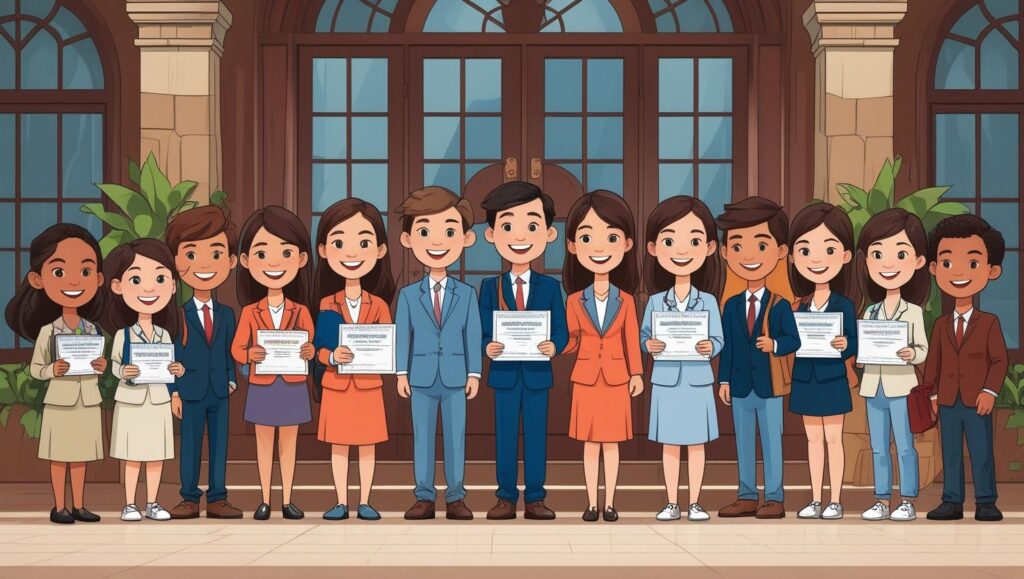Introduction
Latest Full Scholarships for Higher Education, Scholarships change lives. Importantly, full scholarships for higher education cover tuition, living costs, and often travel and insurance. As a result, students from lower-income backgrounds can access top universities abroad. Moreover, scholarships reduce debt, expand networks, and open career doors. Therefore, if you want to study a master’s or PhD without financial burden, targeting full awards is essential. This guide focuses on the most prominent programs that regularly offer full funding. It also explains how to choose the right scholarship. Finally, it shares application tips, required documents, and calendar checkpoints so you can plan a competitive application. Apply here
Why chase full scholarships for higher education now
First, global mobility is growing again. Many governments and universities have restored or expanded scholarship budgets. Second, competition is fierce, but opportunities are targeted to diverse applicants. Therefore, you should prepare early and apply widely. Also, full scholarships bring more than money: they include mentorship, alumni networks, and career support. Consequently, winners often access jobs, research positions, and leadership roles after graduation. Finally, because policies and calls change yearly, staying updated matters. So sign up for official newsletters and follow scholarship pages to catch opening windows and eligibility changes as soon as they appear.
How to choose the best full scholarship for you
Start by matching goals. That means consider field of study, degree level, and preferred country. Then, check eligibility: many awards require citizenship, age limits, or work experience. Next, evaluate coverage: some grants fully fund tuition and stipend, while others only cover tuition. Also, consider the selection emphasis — e.g., leadership, research potential, or development impact. Further, look at program length and post-study obligations, such as return-home clauses. Importantly, prioritize scholarships with clear, official guidance. Finally, plan your calendar. Many top programs open once yearly and require references and language tests, so you’ll need months to prepare.
Fulbright Foreign Student Program (USA) — flagship full funding
The Fulbright Foreign Student Program funds graduate study and research in the United States. It operates in 160+ countries and awards thousands of grants annually. The program typically covers tuition, fees, a living stipend, health insurance, and travel. Therefore, it ranks among the most comprehensive full scholarships for higher education worldwide. Selection emphasizes academic merit, leadership, and potential to foster mutual understanding. Applications are usually submitted through U.S. embassies or Fulbright commissions in the candidate’s home country. Because Fulbright calls vary by country and year, check your national Fulbright page for deadlines and country-specific requirements. For official details, see the Fulbright Foreign Student site.

Chevening Scholarships (UK) — one-year fully funded master’s
Chevening Scholarships support one-year master’s degrees at UK universities. They are fully funded and include tuition, a living allowance, travel costs, and additional grants. Chevening emphasizes leadership, networking, and the potential to effect change in your home country. Typically, candidates require a strong academic background, two years’ work experience, and a compelling personal statement. Importantly, applications open annually and follow a structured timeline. Also, Chevening provides a global alumni network that can be career-changing. For exact application dates, shortlists, and FAQs, consult the official Chevening site — it’s the authoritative source for the latest call and country pages.
Erasmus Mundus Joint Master Degrees (EU) — multi-university full scholarships
Erasmus Mundus Joint Master Degrees (EMJMDs) are integrated international master’s programs taught by consortia of European universities. Top students can win full scholarships that cover tuition, a monthly stipend, travel, and insurance. Additionally, some EMJMDs include study in multiple countries, which boosts intercultural experience and employability. Selection is merit-based and highly competitive. Importantly, the EU publishes programme lists and scholarship rules each year, and new EMJMDs are regularly selected. Therefore, check the Erasmus+ catalogue early and apply directly to the consortium’s admission portal. For the latest program lists and scholarship amounts, see the Erasmus+ information pages.
DAAD Scholarships (Germany) — research and study fully funded options
The DAAD (German Academic Exchange Service) offers a broad suite of scholarships for international students and researchers. Many DAAD grants cover monthly stipends, travel allowances, tuition (if applicable), and health insurance. Programs include master’s scholarships, doctoral funding, and short research stays. Notably, DAAD funding often complements university scholarships and research projects. Because Germany has no tuition at many public universities, DAAD stipends are especially valuable for living costs and research expenses. Also, DAAD’s searchable database helps applicants find targeted funding. For program details, eligibility criteria, and how to apply, use the DAAD official scholarship pages.
Commonwealth Scholarships — for citizens of member countries
Commonwealth Scholarships support students from Commonwealth countries to study in the UK and other locations. These scholarships commonly fund tuition, living costs, and travel. The emphasis is on development impact, so applicants often need to show how their studies will benefit their home country. Also, some Commonwealth awards focus on specific fields like STEM, public health, or sustainable development. Because selection criteria and funding packages can change, check official Commonwealth scholarship portals and your national nominating agency. Additionally, successful applicants join a large alumni network that supports professional growth and collaboration.
Gates, Rhodes, and Schwarzman — elite fellowships with full funding
Several high-profile fellowships offer full funding plus prestige. For example, Gates Cambridge provides full funding for graduate study at Cambridge University and emphasizes academic excellence and leadership. Rhodes Scholarships fund postgraduate study at the University of Oxford, emphasizing outstanding intellect, character, leadership, and commitment to service. Schwarzman Scholars fund a one-year master’s at Tsinghua University in Beijing, focusing on global leadership and China studies. These programs provide tuition, living expenses, travel, and mentorship. However, they are extremely competitive. Therefore, prepare a standout academic record, strong recommendations, and clear evidence of leadership and impact to be competitive.
MEXT (Japan) and KGSP (Korea) — government full scholarships in Asia
Japan’s MEXT scholarships and South Korea’s Global Korea Scholarship (GKS/KGSP) fund international students for undergraduate, master’s, and doctoral studies. Both programs typically cover tuition, monthly stipends, travel, and language training. Further, they often require applicants to apply via embassies or university recommendations. Importantly, these scholarships include pre-degree language programs to ensure academic success. As these awards are government-run, selection criteria and timelines are published annually by education ministries and embassies. Consequently, check official MEXT and Study in Korea portals for updated calls and country-specific instructions.
Australia Awards and New Zealand Scholarships — full support in Oceania
Australia Awards and New Zealand scholarships fund students from eligible countries to study in those nations. Usually, awards cover tuition, return air travel, living allowance, and health insurance. Many prioritize applicants who will contribute to development goals and public service in their home country. Also, these scholarships often require a commitment to return home and share new skills. Because application cycles align with academic intakes, timely preparation for references, statements, and health checks is essential. For the full details and country eligibility, consult respective government scholarship pages from Australia’s Department of Foreign Affairs and Trade and New Zealand’s Ministry of Foreign Affairs.
Practical application tips to win full scholarships
First, start early — give yourself months to craft essays and secure references. Second, tailor every statement to the scholarship’s mission. Third, quantify achievements and show measurable impact. Fourth, build relationships with referees and brief them on your goals. Fifth, prepare for tests like IELTS, TOEFL, GRE, or GMAT if required. Sixth, submit clean and well-formatted documents; academic reviewers value clarity. Seventh, use official guidance and past successful application samples when possible. Finally, apply to multiple scholarships and programmes to increase your chances. Remember, persistence matters: many winners applied more than once before they succeeded.
Documents, deadlines, and common pitfalls
Commonly required documents include transcripts, degree certificates, two to three reference letters, a CV, personal statements, research proposals (for PhDs), and language test scores. Also, some scholarships require medical checks or police certificates. Deadlines often fall months before course start dates. Therefore, track national application windows and embassy submission rules carefully. Major pitfalls include missing deadlines, weak or generic essays, underprepared referees, and inconsistent documentation. To avoid these, create a spreadsheet for each scholarship listing deadlines, requirements, and contact points. Also, double-check formatting, page limits, and file types before submission.
Conclusion — next steps to claim a full scholarship
In short, full scholarships for higher education are attainable with focused preparation. First, shortlist programs that match your goals and eligibility. Second, prepare strong documents and practice interview skills. Third, use official scholarship pages for the latest deadlines and application processes. Fourth, apply widely and learn from each application cycle. Finally, remember that scholarships bring mentorship and networks beyond funding. So pursue them strategically, and you may transform your career and community. Good luck — and start your applications today. apply here

I’ll definitely come back and read more of your content.
I like how you kept it informative without being too technical.
You have a real gift for explaining things.
I enjoyed your take on this subject. Keep writing!
**aquasculpt**
aquasculpt is a premium metabolism-support supplement thoughtfully developed to help promote efficient fat utilization and steadier daily energy.